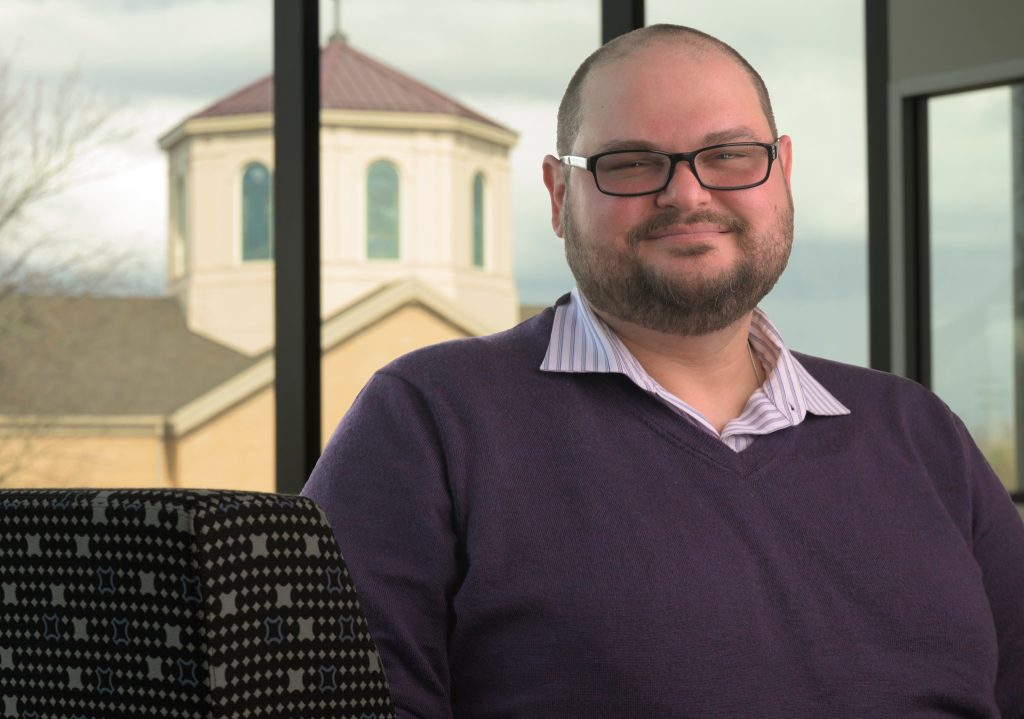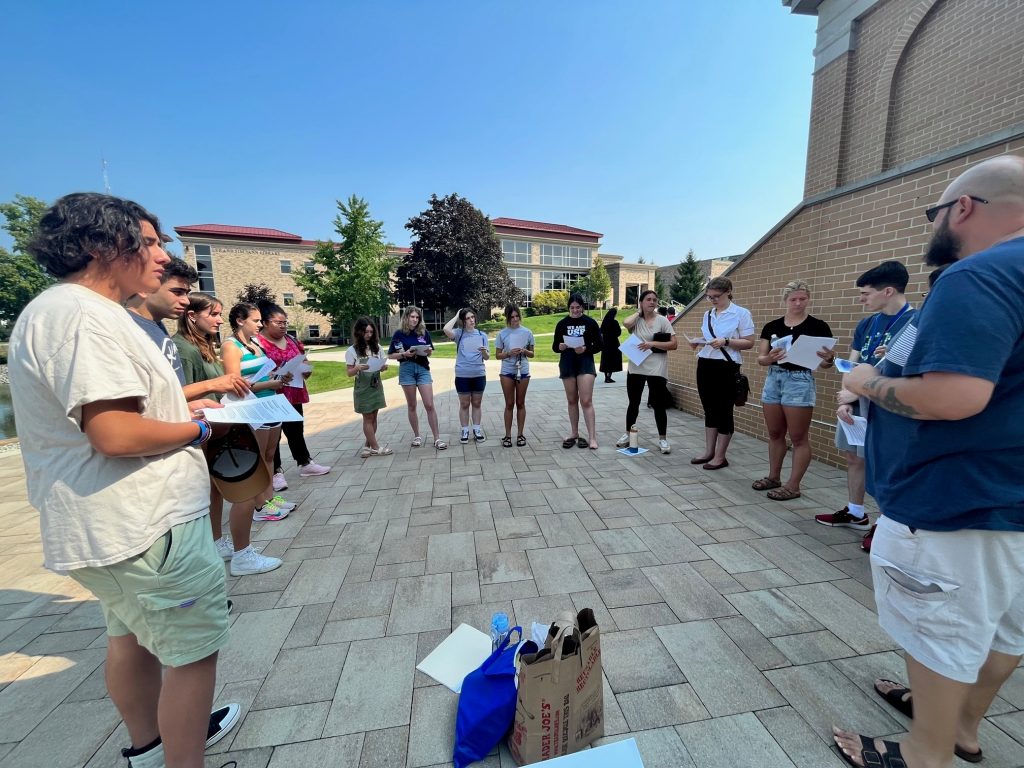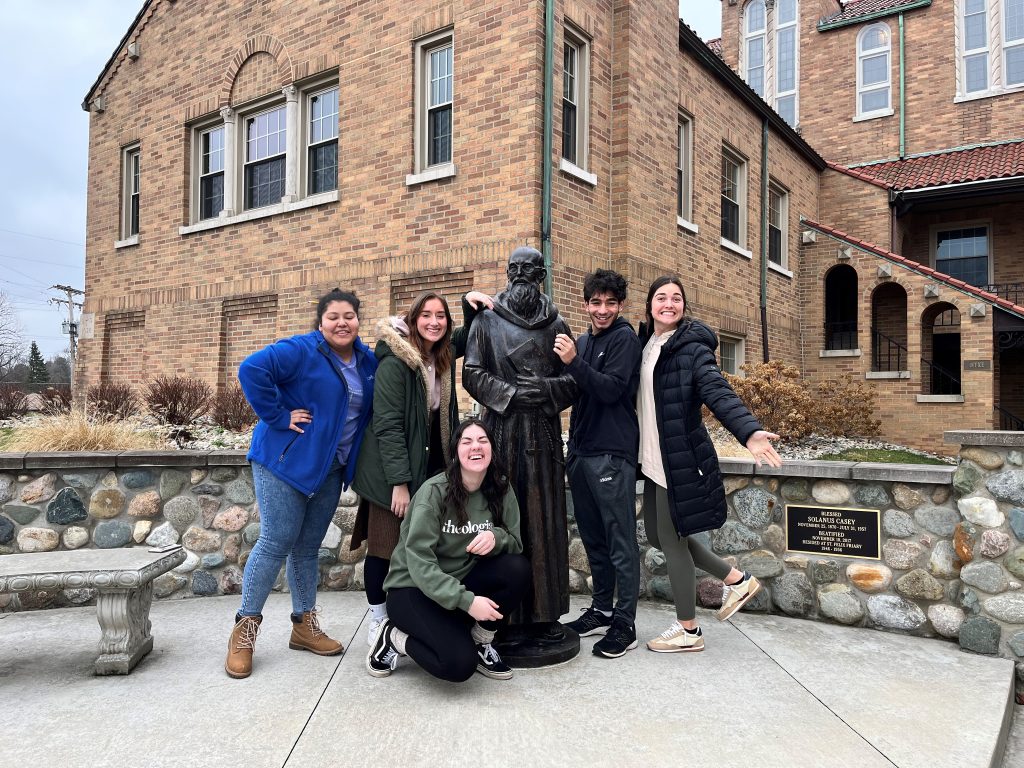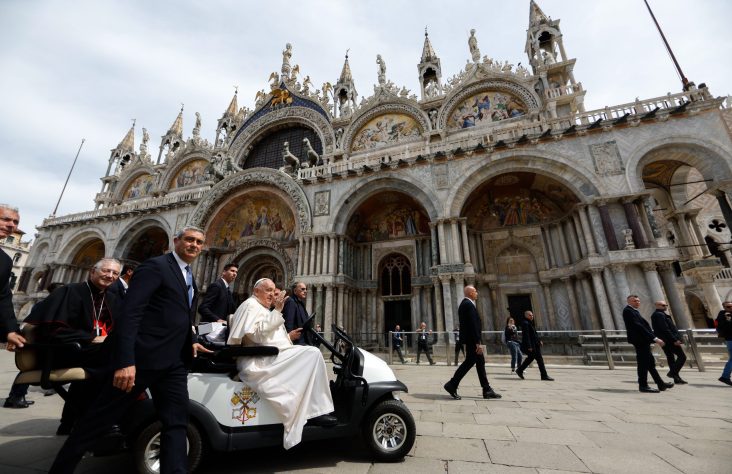February 14, 2024 // Diocese
‘I Get to See the Work God Is Doing in Youth’
Alex Giltner, Saint Francis’ New VP for Catholic Culture, on the Role of Catholic Colleges and the Future of the Church
In December, the University of Saint Francis in Fort Wayne announced the promotion of Alex Giltner, Professor of Theology and Director of the university’s Assisi Program for Discipleship and Leadership. Giltner will now serve as the university’s Associate Vice President for Catholic Culture. In his new role, he will continue his work teaching and with the Assisi Program, which he helped to establish in 2022, but now he will also oversee ministerial initiatives across campus and strive to “integrate the university’s Catholic mission in a full, robust, and intentional way, where everybody, regardless of their role or department, sees their work as part of sharing and moving forward the mission of Saint Francis as a Catholic institution.”

Photo provided by the University of Saint Francis
Alex Giltner was recently promoted by the University of Saint Francis to become its Vice President for Catholic Culture.
University of Saint Francis Interim President Lance Richey told Today’s Catholic: “We are all excited about Dr. Giltner stepping into his new position as he helps us further cultivate the Catholic culture at Saint Francis. He has established a strong rapport and trust with our students and understands how to help and encourage them wherever they are on their life journey. I look forward to the impact he will undoubtedly make this spring and beyond.”
In a wide-ranging interview with Today’s Catholic, Giltner discussed his work with the Assisi Program, the faith life at Saint Francis, how he sees today’s college students yearning for deeper meaning in their own lives, and why he doesn’t fear for the future of the Church.
The interview has been edited for length and clarity.
Today’s Catholic: First, congratulations on your promotion. Do you see this new role as a move by the university to be even more intentional about fostering the Catholic culture on campus, or is this a continuation of work that had already begun?
Alex Giltner: I will say both. Since I came to Saint Francis in 2018, the Franciscan sisters have done great work in thinking through what their apostolates look like and how to incorporate their charisms within the scope of the university. They’ve really been casting this vision that we become more robustly, more clearly, more intentionally, and more genuinely in line with our Catholic identity, with Ex Corde Ecclesiae – Pope St. John Paul II’s document on the Catholic university – and really living out in an intentional, welcoming, uncompromising, but compassionate, loving, and kind way service to humanity in spreading the Gospel through knowledge, through education, through formation.

Photos provided by the University of Saint Francis
Alex Giltner, right, gathers with members of the Assisi Program for Discipleship and Leadership at Saint Francis.
What makes Catholic education so wonderful, aside from it being one of the oldest institutional forms of education, is that we form the whole human, the whole person – spirit, mind, and body. We do not just train students on a particular skill or transfer information to them. We are not just training people for a career. We are forming whole human beings; we are caring for the whole person, cura personalis, and helping them to be good people of good character who are also well trained in whatever their major or discipline is so that they can contribute to the commonweal.
Today’s Catholic: What does this intentionality regarding Catholic culture look like at the practical level? How does it filter down to the students at Saint Francis?
Giltner: I think there’s a process of communication, clarification, equipping, and empowering that has to be done. I think what students are seeing is that when we are talking about what we do here, we’re talking about human formation. We’re offering them programs like the St. Benedict the Moor Justice Center, like Campus Ministry, like student leadership, and each of these works to form the character of all our students – not just those who are Catholic, or even Christian.
In everything we try to do here, we’re still bringing to bear that question about meaning, and purpose, and morality, and how one lives a life of full human flourishing, and how one can live a life of service so that others can live lives of full human flourishing. I think that really is supposed to trickle down through our classroom and our curriculum, through our co-curricular programs, through programs like the Assisi Program, and others. I think there’s a communication and clarification happening across the board for students through staff and faculty. It’s an ongoing process, of course, but it’s something we’re striving to more clearly manifest as time goes on.

Students in the Assisi Program at Saint Francis gather around a statue of Blessed Solanus Casey at the St. Felix Catholic Center in Huntington during a recent retreat.
Today’s Catholic: This past fall, the university welcomed its second cohort into the Assisi Program for Discipleship and Leadership. How did the vision of the program begin, and how has it evolved during its first couple of years?
Giltner: The basic idea stemmed from the fact that we had all heard the data on young people and their migration away from religious practices. And for us, we are all aware that, oftentimes, college is where the fates of young people go to die. We wanted to provide something that comes alongside students and helps their college experience not be in conflict with their life of faith but actually be a partnering of their life and their faith. We wanted to give students an experience of faith and reason so they could actually see how their academic training and education nurtures the deepening of their faith, and then that increased faith helps to deepen their experience of that education. Then, ultimately, this discipleship will help to transform them into effective, powerful Catholic leaders who can go out and spread the Gospel. And that doesn’t just look like going out in the street and preaching.
It looks like being a certain kind of nurse. It looks like being a certain kind of graphic designer, being a certain kind of journalist who lives out their faith, who can speak clearly, and compassionately, and intelligently about their faith.
What the program was meant to be was a Catholic formation program where students are trained not just in discipleship and leadership but in how those two things come together to produce a fuller experience of the college journey, which would lead to a more effective and impactful experience of their own vocation.
Today’s Catholic: While you’re only just a year and a half into it, how is the program going from your perspective?
Giltner: Well, we’re kind of building the bridge while we’re walking across it, right? But so far it has been one of the most rewarding experiences of my entire career, getting to work with these students and fulfilling the trite adage that they teach me more than I teach them. It’s been incredible to see the impact of how the life of discipleship just enriches all these other things that we do, whether you’re a college student, or you’re in the workforce, or you’re being a parent. It really broadens the horizon of possibility and imagination of what a life built on the foundation of discipleship can do. It shows that our careers are not just these private things we go off and do that might have some tangential connection to our other stuff – being a parent, or a student, or a worker, a professional – but that these are expressions of who I am as a disciple, with Jesus at the center founding and framing everything that we are. When you get to work with students and see that happening – and it’s not by your power, it’s by the grace of God – it’s hard to express the depth of beauty that that gives to somebody.
Today’s Catholic: As somebody who works with college students, you likely hear it more than most, but the common perception is that this is a generation full of kids who are fleeing the Church and all forms of religious practice. Mental health and isolation are major concerns. What are you seeing?
Giltner: While statistics show a real cause for concern, young people today seem to be seeking something greater, and they are hungry for meaning, because the culture’s not giving them what they need. We’re not made for riches and fame and clothes and power; we’re made for love and truth and meaning and goodness. In a culture that doesn’t care about the truth – and when it does talk about the truth, it generally despises it in this sort of postmodern relativism that views truth as a social construct and a power play – you’re basically forming an entire culture to think that their lives don’t have any ultimate meaning, and that they do not have any inherent value. And that’s why they have to reconstruct themselves and their identity, because they’re unaware of this God-given inherent identity that already answers the question of meaning and purpose and worth.
But the message the Church has is a message that your life does matter, that there is meaning, that there is purpose and redemption in your suffering and your challenges. And that all flows from the fact that you are a unique human person who is loved by God in your uniqueness. That is not a message that people are finding out there, and to know that meaning and purpose is one way in which our own lives are folded into the reality of God’s love. In knowing that, we see that our lives now become this further revealing of the God who made us and loves us. I think that we’re going to continue to see people get more and more hungry for that kind of truth, and I think that we’re also seeing a culture where it’s harder and harder to find that.

Today’s Catholic: That sort of dovetails into why the mission of Saint Francis and other Catholic universities, high schools, and even grade schools remains so important, correct?
Giltner: When we did our new student orientation in January, the first thing we told them – whether they are Catholic or Christian or of no religious tradition at all – was: You are a child of God. You have inherent dignity and worth as a human being, and we’re not here to just teach you how to make a good spreadsheet or write a research paper; you’re here to learn about your infinite value as a child of God, and then how that can provide meaning and purpose to your life, and that the world is not just the sometimes cold place it can seem, but that there is a deep calling that resonates with each of us, and it’s a statement about the fuller meaning of what it means to be human.
Like, Ex Corde Ecclesiae says, the Catholic university exists to help people come to the full measure of their humanity. That’s the business we’re in.
Today’s Catholic: Again, there’s so much negativity surrounding the perceived lack of faith by young people, but you see the young Church up close every day. Are you worried about its future?
Giltner: No. And I say that in kind of two ways. One is my vantage point as a historical theologian. God has always raised up, every generation, people who are sold out for him and who are going to change the world. For example, on the road to Damascus, this thing happens, and a killer of Christians becomes an apostle who wrote half of the New Testament, and that changed the course of history. … I see students here every day who are going to change the world, they’re going impact the world. God has lit them on fire, and this fire has sent them out into a world that needs them. And so no, I don’t worry about the future of the Church.
One of the cool things about my job is I get to see up close the kind of work God is doing in youth that’s going to change the world. And I know that God is not just doing it here; he’s doing it all over the world. He always raises up leaders, and to get to see that happen and be a part of that is one of the most amazing things that I’ve ever done.
The best news. Delivered to your inbox.
Subscribe to our mailing list today.






